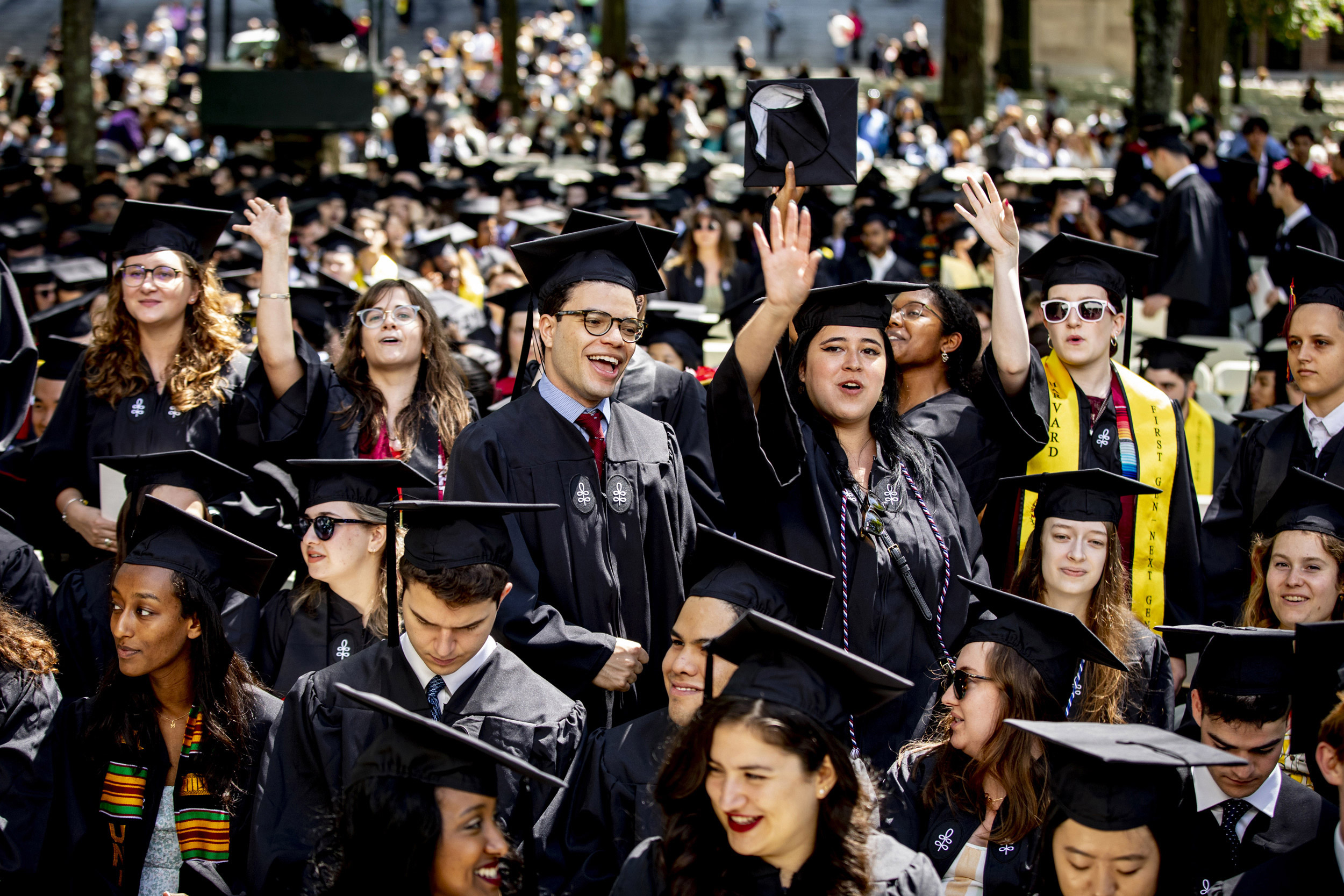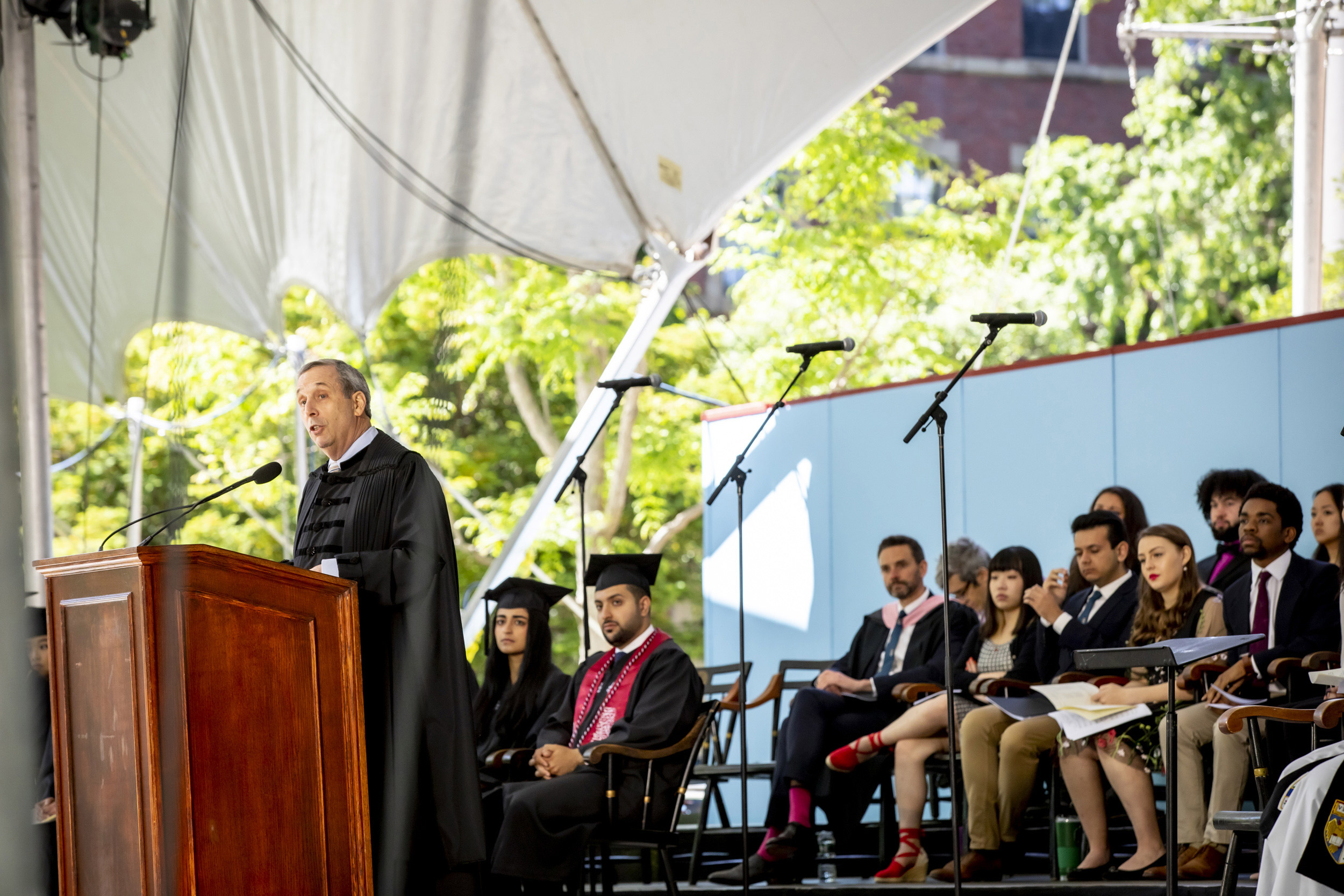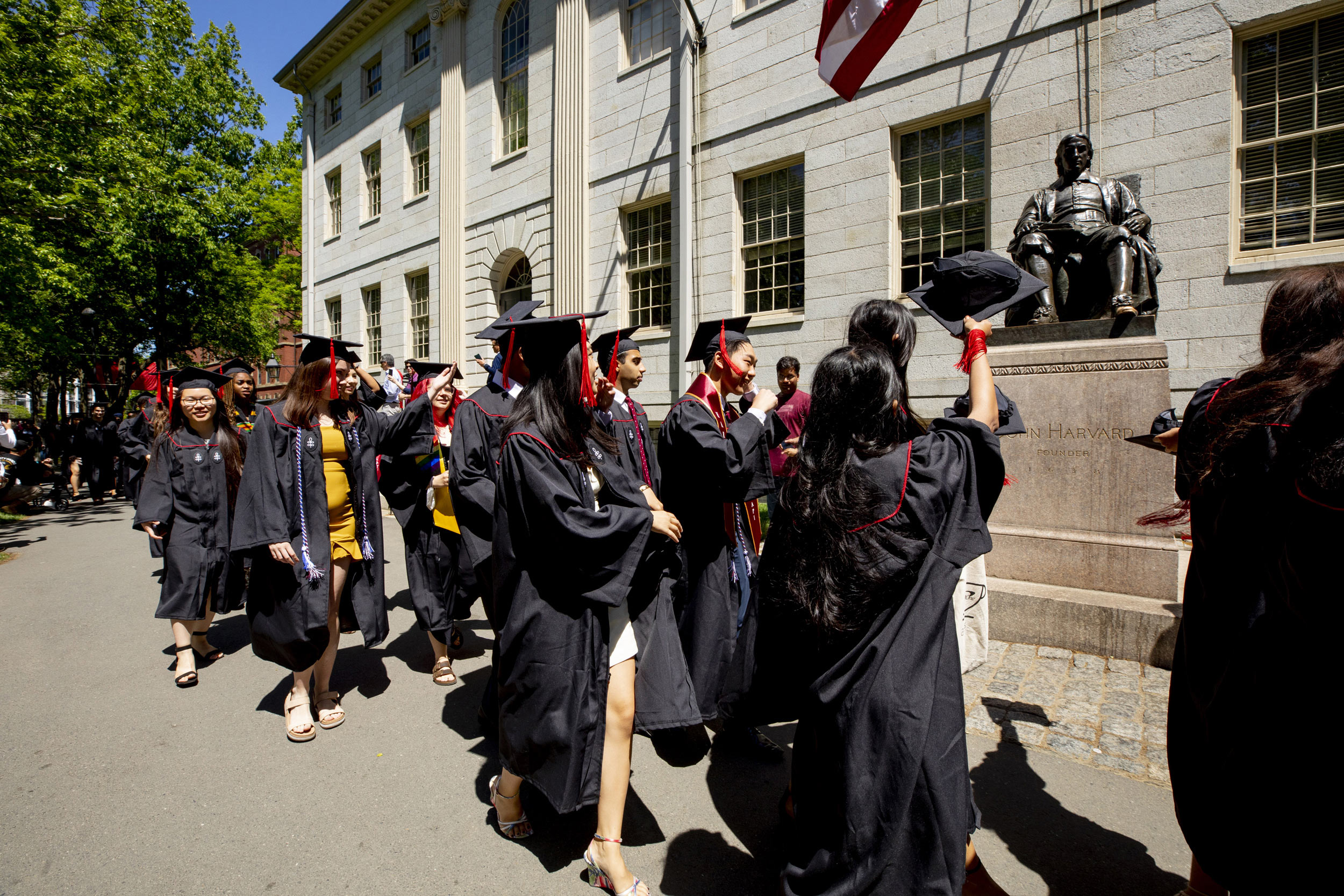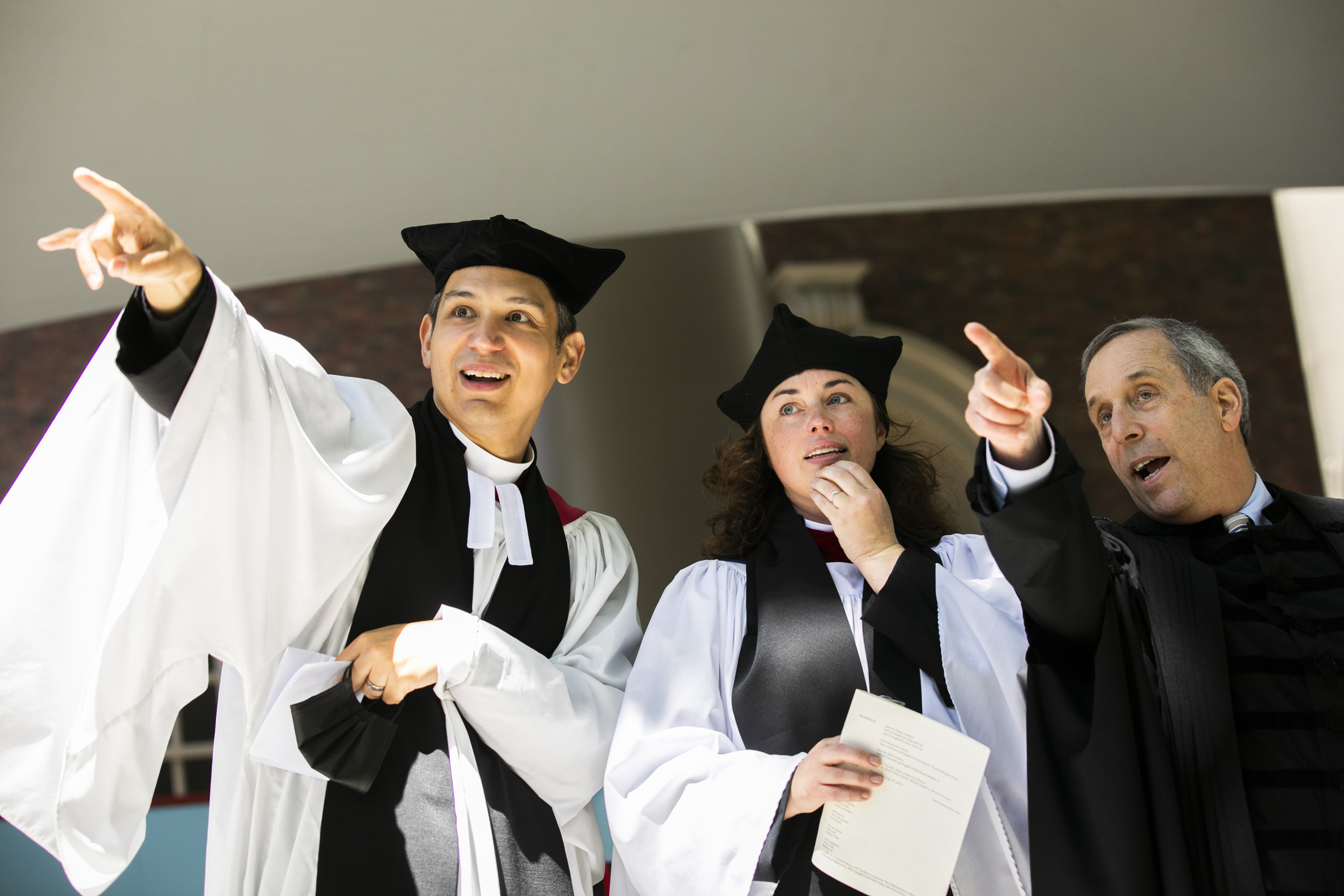
The first in-person Baccalaureate in two years brought seniors into Tercentenary Theatre instead the traditional stop at Memorial Church.
Rose Lincoln/Harvard Staff Photographer
Bacow urges seniors to embrace the unexpected
University president points to path of his own life, those of other Harvard notables, students’ own pandemic disruptions
Harvard seniors dressed in their black caps and gowns filed into Tercentenary Theatre on Tuesday afternoon to attend the Baccalaureate ceremony, a Commencement week ritual that includes scriptural readings from various religious traditions, song, as well as an address from Harvard’s president.
This year’s event, the first in-person Baccalaureate in two years, was somewhat different. Instead of processing into the Memorial Church, seniors filed into seats outside, making their way through the leaf-covered site to the sounds of Harvard University Band instead of a church organ — the reason behind the change of venue impossible to ignore.

“I don’t think I have ever been prouder of any graduating class at any University that I’ve been affiliated with than the Harvard College Class of 2022,” said President Larry Bacow.
Rose Lincoln/Harvard Staff Photographer
From the dais, President Larry Bacow recalled challenging the then first-year students “exactly 1,359 days ago” when they met during their 2018 Convocation to explore everything the University had to offer. He noted he could never have imagined when he made the difficult decision to send students home in March of 2020 amid the spreading pandemic “that two years later, and after one million people had succumbed to this virus in the U.S. alone, that we would still be dealing with a public health crisis.”
“Your class has been tested in ways that few others have been. You’ve demonstrated extraordinary resilience and patience, both skills that will serve you well as you prepare for life after Harvard. Based upon what I have seen of you and how you have met this moment, I have great faith that you, like those who came before you, will find your way, and will make your mark on the world,” said Bacow. “I don’t think I have ever been prouder of any graduating class at any University that I’ve been affiliated with than the Harvard College Class of 2022.”
Turning to their life beyond Harvard’s gates, Bacow urged his listeners to embrace unexpected opportunities, as he recalled some of his own surprising career turns. He was completing his Harvard Ph.D. and making plans to join the Carter administration in Washington, D.C., he said, when he was asked to return to his alma mater, MIT, for a lower-paying, two-year position. Later, as he was preparing to leaving academia, his MIT department chair asked him to “consider taking on major administrative responsibility to launch a new academic program.” Then “flash forward 35 years.” He was a member of Harvard’s presidential search committee and “semi-retired” after a decadelong stint leading Tufts University when the committee chair asked him to consider becoming a candidate for the job.

Seniors wave to the John Harvard Statue as they make their way through Harvard Yard.
Rose Lincoln/Harvard Staff Photographer
“If I had said ‘no’ to any one of these three questions, I wouldn’t be standing here today. And this is not to say that I am prescient, or wise, or courageous, or brave, none of those things — just that I was open to seeing where roads I hadn’t considered might actually take me. That way of moving through the world has taken me to some pretty interesting places — and actually being here, standing behind this podium talking to you today, is just one of them.
“You, too, are going to have plenty of chances to consider other paths for yourselves, paths that will appear to you unexpectedly — even inconveniently, just as those appeared to me. Be willing to take those chances,” said Bacow.
To emphasize his point, Harvard’s 29th president pointed out some other Harvard notables who took the road less traveled. Jorie Graham, Boylston Professor of Oratory and Rhetoric, was planning to become a filmmaker as an undergrad at NYU, he said, until a chance encounter with some lines from “The Love Song of J. Alfred Prufrock” by T.S. Eliot set her on a different path. Graham won the Pulitzer Prize for poetry in 1996.
This year’s Harvard Arts medalist, Rubén Blades, L.L.M. ’85, was envisioning a career in the law until a dean of his law school in Panama told him that in order to reflect the dignity of the profession, he would have to give up singing. Blades went on to win 17 Grammy and Latin Grammy awards, in addition to his success as an actor and politician.
Bacow also mentioned Ray Hammond, who graduated from Harvard College at 19 and Harvard Medical School at 23 and became a surgeon, but ultimately chose to heal people in a different way. Today known as the Rev. Ray Hammond, he is the founder and pastor of Bethel African Methodist Episcopal Church in Boston and “one of Boston’s most influential spiritual leaders.”

Pusey Minister Matthew Ichihashi Potts, (from left), associate minister Alanna Sullivan, and Harvard President Larry Bacow look out from the stage before the service begins.
Stephanie Mitchell/Harvard Staff Photographer
“Neither Jorie nor Rubén nor Ray could dream of where a single voice would take them,” said Bacow, “but they listened nonetheless, paying close attention to the world around them as they imagined how and where they wanted to focus their attention and time.”
Bacow also encouraged the hyper-connected generation to turn off their screens and connect instead with the world around them in order to find those “random events of profound influence.”
“Please, please, as you leave here, engage and embrace the world personally with passion and enthusiasm,” he said. “If you do, if you’re lucky, you too will someday be inspired by the unexpected.”
Building on the 19th-century tradition of Harvard seniors inviting the president to address them, the afternoon event also featured readings from a range of texts from different faith traditions, a selection of anthems and hymns, and an opening salutation and closing benediction from Matthew Ichihashi Potts, the Pusey Minister and Plummer Professor of Christian Morals. “Harvard Class of 2022, generations of your futures depend upon you,” Potts told them. “They wait to sing your celebrations that will be written in your honor. Feel their hope in your hearts and follow the call of their longing.”
On his way to the Widener Library steps after the service to pose for his class photo, economics concentrator Rosan Bishwakarma said being part of the in-person service held special meaning. “It was a time, an hour, that was filled with reflection and gratitude, and it really made me realize again how grateful I am to have had the opportunity to be here.”




